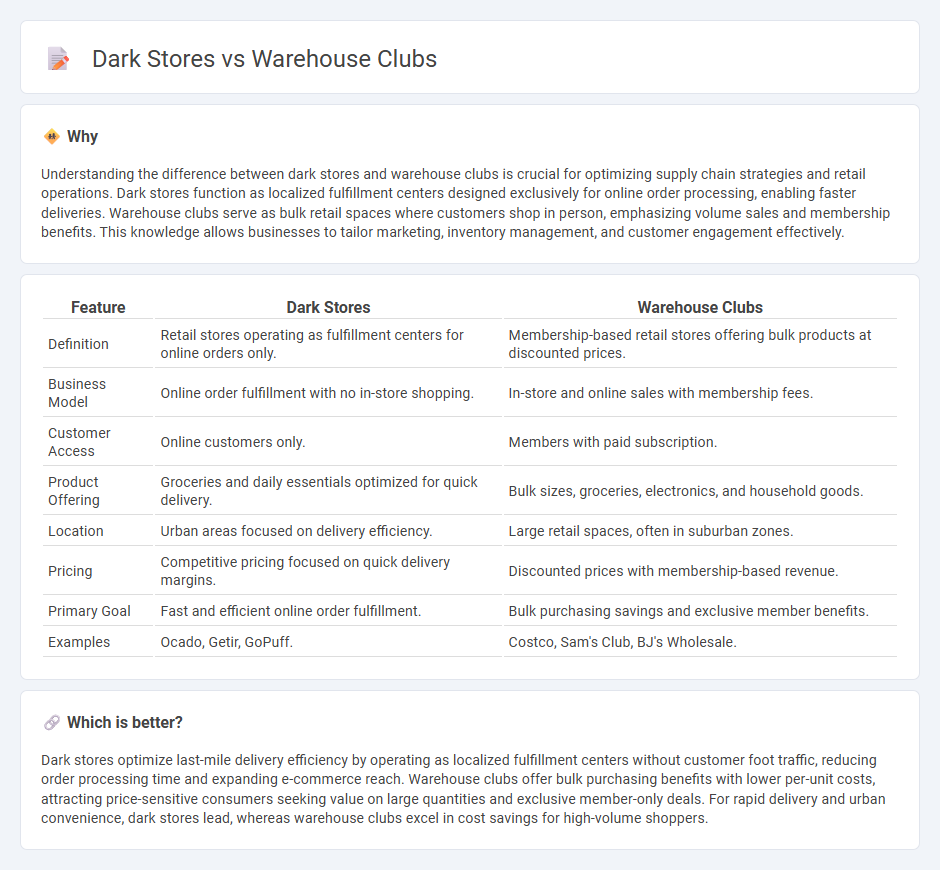
Dark stores operate as localized fulfillment centers designed specifically for rapid e-commerce order processing, enhancing delivery speed and convenience. Warehouse clubs function as large retail spaces offering bulk products at discounted prices, catering primarily to members seeking cost savings on staple goods. Explore the differences and benefits of dark stores versus warehouse clubs to optimize your shopping strategy.
Why it is important
Understanding the difference between dark stores and warehouse clubs is crucial for optimizing supply chain strategies and retail operations. Dark stores function as localized fulfillment centers designed exclusively for online order processing, enabling faster deliveries. Warehouse clubs serve as bulk retail spaces where customers shop in person, emphasizing volume sales and membership benefits. This knowledge allows businesses to tailor marketing, inventory management, and customer engagement effectively.
Comparison Table
| Feature | Dark Stores | Warehouse Clubs |
|---|---|---|
| Definition | Retail stores operating as fulfillment centers for online orders only. | Membership-based retail stores offering bulk products at discounted prices. |
| Business Model | Online order fulfillment with no in-store shopping. | In-store and online sales with membership fees. |
| Customer Access | Online customers only. | Members with paid subscription. |
| Product Offering | Groceries and daily essentials optimized for quick delivery. | Bulk sizes, groceries, electronics, and household goods. |
| Location | Urban areas focused on delivery efficiency. | Large retail spaces, often in suburban zones. |
| Pricing | Competitive pricing focused on quick delivery margins. | Discounted prices with membership-based revenue. |
| Primary Goal | Fast and efficient online order fulfillment. | Bulk purchasing savings and exclusive member benefits. |
| Examples | Ocado, Getir, GoPuff. | Costco, Sam's Club, BJ's Wholesale. |
Which is better?
Dark stores optimize last-mile delivery efficiency by operating as localized fulfillment centers without customer foot traffic, reducing order processing time and expanding e-commerce reach. Warehouse clubs offer bulk purchasing benefits with lower per-unit costs, attracting price-sensitive consumers seeking value on large quantities and exclusive member-only deals. For rapid delivery and urban convenience, dark stores lead, whereas warehouse clubs excel in cost savings for high-volume shoppers.
Connection
Dark stores operate as localized warehouses optimized for online order fulfillment, enabling faster delivery and reduced last-mile costs. Warehouse clubs function as membership-based retail outlets that combine bulk inventory storage with direct consumer sales, often leveraging their extensive supply chains for efficient stock replenishment. Both models emphasize inventory management and streamlined logistics to enhance consumer access to products while minimizing operational expenses.
Key Terms
Bulk Purchasing
Warehouse clubs specialize in bulk purchasing by offering large quantities of products at discounted prices, catering primarily to families and small businesses seeking cost savings. Dark stores, designed for online order fulfillment, optimize inventory for quick bulk order processing without traditional retail displays, enhancing efficiency in meeting high-volume demands. Explore the operational advantages and consumer benefits of bulk purchasing through warehouse clubs and dark stores to understand their distinct roles in modern retail.
Membership Model
Warehouse clubs operate on a membership model requiring customers to pay an annual fee for access to bulk products at discounted prices, targeting cost-conscious shoppers seeking value. Dark stores, primarily designed for online fulfillment, may or may not use membership models but typically focus on convenience and speed rather than bulk discounts. Explore the distinct advantages and customer engagement strategies of each approach to understand how membership impacts retail experiences.
Micro-Fulfillment
Warehouse clubs prioritize bulk inventory and high-capacity storage for efficient fulfillment of large orders, while dark stores emphasize rapid, localized order processing through micro-fulfillment centers designed for e-commerce. Micro-fulfillment technology integrates robotics and AI to optimize storage density and picking speed within dark stores, enhancing last-mile delivery efficiency. Discover how micro-fulfillment is reshaping retail logistics and consumer experiences.
Source and External Links
Warehouse club - Wikipedia - Warehouse clubs are large retail stores that sell a variety of goods in bulk, require paid memberships, and offer lower prices through a no-frills shopping experience.
Club Stores: The Market Leaders - Blue Book Services - The warehouse club industry is mainly served by Costco, Sam's Club, and BJ's Wholesale Club, offering limited assortments of items primarily in bulk sizes to both businesses and households with annual memberships.
Are Warehouse Clubs Worth It? Let's Talk Pros and Cons - Warehouse club memberships can save families over $1,000 annually on groceries and household items, but selecting specific products like gas, tires, and bulk consumables maximizes your savings.
 dowidth.com
dowidth.com